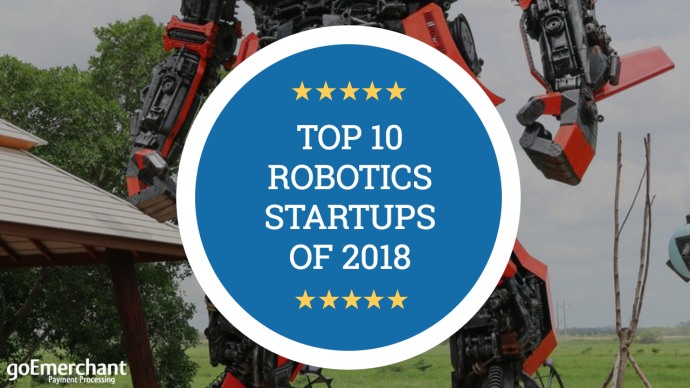The future is here, and innovative robotics technology is entering every corner of modern life. Startups are at the forefront of robotics development and design. In the competitive field of modern robotics, only a few companies have what it takes to survive and thrive. Here are the ten most successful robotics startups of 2018.
1. Ubtech Robotics
One of China’s most valuable unicorn startups, Ubtech was destined for big things when it was founded by Zhou Jian in 2012. Zhou’s goal was to manufacture a more affordable humanoid robot that could be in every home. The company has turned out one robot model after another, quickly becoming the top robotics firm in China. Ubtech now offers dancing robots, educational robots, toy robots and even security robots.
2. Saildrone
Engineer Richard Jenkins has had a lifetime obsession with the ocean. In 2012, he launched his own startup to develop a sea-going robotic ship. Powered by solar and wind energy, the bright orange drones traverse the sea, using GPS to navigate. The unmanned saildrones are used in scientific research, tracking weather and climate information and collecting data on migrating sealife. Jenkins’ speedy sailers have caught the eye of investors, who have invested over $88 million in the nascent firm.
3. Soft Robotics Inc.
While some robots vacuum and others patrol perimeters, the robots from Soft Robotics Inc. are designed to help manufacturers and packers more safely move and store their products. The company designs ultra-pliable robotic arms that can harmlessly and quickly shuffle and pack everything from cookies to writing pens. Founded in 2013 by entrepreneur Carmichael Roberts and George M. Whitesides, a world-renowned Harvard chemist, the company has raised $20 million this year from firms likes Yamaha and Hyperplane Venture Capital.
4. Arevo Labs
In 2013, engineer Riley Reese decided to strike out on his own after working for medtech firm Stryker Corporation for a few years. He founded Arevo Labs, a startup in the burgeoning 3D printing sector. With the help of his marketing and business partners, Wiener Mondesir and Shekar Mantha, Reese developed a new prototype of robotic arm designed to simplify 3D printing of complex airplane and satellite parts. Arevo recently completed its Series B funding round, collecting $12.5 million from a bevy of investors that includes Vinod Khosla’s Khosla Ventures.
5. UiPath
Romanian entrepreneur Daniel Dines was working at Google when he decided to launch his own robotics startup with fellow engineer Marius Tirca. The pair elected to focus their skills on the world of business, developing a software robot that manages and processes invoices by itself. Designed to integrate with already-existing invoice management software, UiPath‘s AI program works quietly on its own or in conjunction with a human. Silicon Valley venture capital firms have put their stamp of approval on the team’s technology; in March 2018, the startup completed a Series B funding round of more than $150 million.
6. Drive.ai
This Mountain View, California startup was founded after the seven founders met at the Stanford Artificial Intelligence Lab. Using their backgrounds in engineering, robotics, metallurgy and computer science, the team developed self-driving robotic vans. The company has collected dozens of investors along the way, including Northern Light Venture Capital and Hof Capital. With $15 million from their latest venture round, they have successfully tested their vans in San Francisco and Texas and are poised for a public rollout later in the year.
7. Starship Technologies
As Amazon is busy figuring out faster ways to ship by air, Starship has been working on the problem from a different angle. The company is the latest project from Skype co-founders Janus Friis and Ahti Heinla. The startup’s six-wheeled robots can be found on the ground delivering food and groceries in cities like Washington D.C. and London. Starship has had no trouble raising capital; since launching in 2014 they have raised around $20 million in funding.
8. Marble
Founded in 2015 by a trio of classmates at Carnegie Mellon University, Marble intends to take the delivery person out of food delivery. With their wheeled autonomous delivery robots, the company is attempting to transform food delivery. Marble partnered with Eat 24 food delivery in 2017 for their San Francisco launch, a move that prompted investors to come calling. The company recently completed a Series A round of $10 million and plans to use their additional funds to expand into delivering other goods, including groceries, packages and medicine.
9. Glowforge
Dan Shapiro had worked for some of the biggest tech companies in the business, including Google, Microsoft and Photobucket. In 2015, he decided to launch a brand new startup based around a 3D printer that would serve as an etcher and an engraver. The company launched a Kickstarter crowdfunding campaign, receiving a record $27 million from backers. Venture capital firms like Foundry Group and True Ventures have also backed the company. They recently completed a Series B funding round of $10 million.
10. Flirtey
While other delivery startups have focused on food and groceries, the Nevada-based startup Flirtey has set its sights on a higher purpose. Instead of sending hot meals to consumers, Flirtey’s robotic drones quickly deliver life-saving medical equipment and supplies. The drones have successfully transported vital medical supplies in both the United States and New Zealand. In 2017, the company inked a deal with a local ambulance service to deliver cardiac defibrillators to Nevada residents by air. Flirtey’s innovative drones have attracted investment from firms like Menlo Ventures and Qualcomm Ventures.
From manufacturing to delivery, these robotic startups are changing the way modern humans live and work. Whether they’re designing humanoid robots for the home or free-flying robots for the air, these companies are taking the lead in the robotics revolution.


